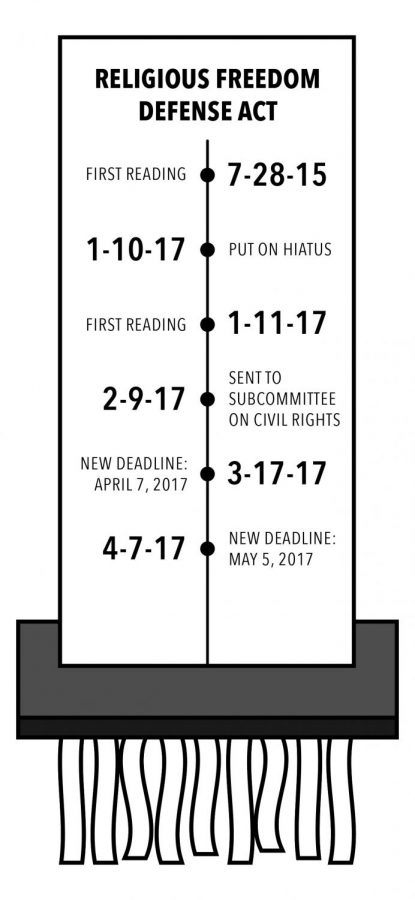State Senate bill could allow LGBTQ discrimination
State Senate bill could allow LGBTQ discrimination
April 17, 2017
A law allowing Illinois residents to discriminate against same-sex couples on the basis of a person’s conflicting religious beliefs is being considered by the State Senate.
Introduced Jan. 11 by State Sen. Kyle McCarter, R-Vandalia, the Religious Freedom Defense Act, or Senate Bill 64, is not specific about what acts fall under one’s religious convictions, but Brian Johnson—CEO of Equality Illinois, a nonpartisan group that advocates for equal treatment of the LGBTQ community—said the bill could reach a wide range of services.
It could govern landlords refusing unmarried couples because they engage in premarital sex, doctors denying birth control to women and businesses rejecting health benefits to same-sex couples, Johnson added.
“This is not just an attack on LGBTQ people,” Johnson said. “This is an attack on women and unmarried people.”
The act would prohibit state and local government officials from discriminating against people who act under a religious belief or moral conviction that marriage is between one man and one woman or that sexual relations are reserved to marriage, according to the bill.
McCarter originally introduced the Religious Freedom Defense Act in July 2015. However, it did not pass through committee.
The bill counters widely accepted Illinois public policy against discrimination, and there is no evidence of current “hardships” on people of faith that make the bill necessary, Ed Yohnka, director of communications and public policy for the American Civil Liberties Union of Illinois, said.
“The idea that we are going to reverse a historic opposition to discrimination, and instead actually write it into our statutes, would be a terrible mistake on the part of the legislature,” Yohnka said. “The minute you create this exemption to abiding by the laws that all the rest of us have to [follow], you are going to see discrimination be ramped up against LGBTQ people.”
All four sponsors of the bill—McCarter; Sen. Neil Anderson, R-Moline; Sen. Tim Bivins, R-Dixon; and Sen. Dale A. Righter, R-Mattoon—did not respond to requests for comment as of press time.
However, John Mauck, attorney at Mauck & Baker, LLC-—a firm that represents cases involving the “religiously oppressed”—said there are a number of cases in which people have been penalized for following their conscience. He pointed to a 2011 case in which a couple was fined $70,000 for refusing to allow a gay couple to be married at their bed-and-breakfast.
“Coercing other people to support your goals [is] where [the law] becomes wrong,” Mauck said. “It disrupts society to not let people have their own opinions and act out of their own conscience.”
Mauck added that the bill will not pass because while it is supported by most conservatives and downstate liberals, the liberal majority will shoot it down.
The bill currently awaits debate in the Subcommittee on Civil Rights with a May 5 deadline, which was extended from an original April 7 deadline, according to state legislative records.
Bill 64 illustrates the ideological divide between conservative Illinois legislators and the 7th U.S. Circuit Court of Appeals, 219 S. Dearborn St., which recently decided a case in favor of the LGBTQ community.
Kimberly Hively, a lesbian, was a mathematics professor at Ivy Tech Community College in Valparaiso, Indiana, for more than 14 years when her contract with the school was not renewed. Under the impression that she was being discriminated against, she filed a charge with the Equal Employment Opportunity Commission and her case eventually landed in the Chicago-based 7th Circuit Court of Appeals, according to the court opinion.
On April 4, under Title VII of the Civil Rights Act of 1964—which makes it unlawful for employers to discriminate on the basis of race, color, religion, national origin or sex—Hively v. Ivy Tech Community College expanded the law, making it unlawful for employers of companies with 15 or more employees to discriminate on the basis of a person’s sexual orientation.
Yohnka said the decision will not affect the bill because it deals specifically with employment and not accommodations. While Title VII is a step in the right direction, turning bills like the Religious Freedom Defense Act into law allows a specific group of people to pick and choose which laws regarding discrimination they want to follow, he added.
“That’s not religious freedom; that’s chaos,” Yohnka said.








